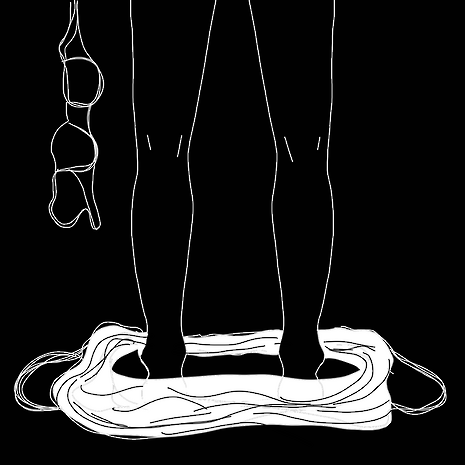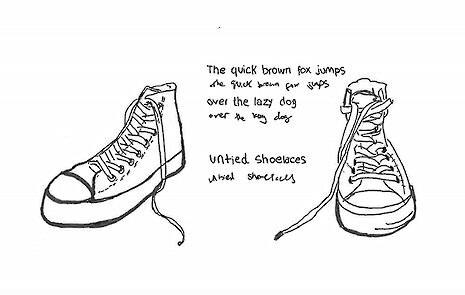Let’s talk about dyspraxia
Mimi Robson and Kitya Mark explore what having dyspraxia, a rarely publicised and frequently misunderstood learning difficulty, can mean for the self-perception of young adults

One of us recalls accidentally throwing a partner out of bed (twice, in under 15 minutes) because it was difficult to adjust to the confines of her single mattress. This opens up a floodgate of memories of mishaps and minor calamities — forgotten names, turning up 50 minutes late after a bitter feud with Google Maps, struggles with items of clothing: the list goes on.
It is perhaps unsurprising that dyspraxia in its more serious forms has an impact on self-perception
There are ways to tell all of these stories as light and entertaining anecdotes; there is something inherently funny about being a ‘klutz’, and at times it can be tempting to play up to this persona. We fulfil the classic ‘arts student’ stereotype, yet this is a stereotype informed by the ingrained sexist view that arts students are generally female, and consequently ‘ditzy’ figures. We want to use this space to reflect on how, although dyspraxics may choose to make a joke out of their experiences, dyspraxia can lead to considerable personal and academic difficulties.
When discussing the effects of dyspraxia, our conversation quickly moved to the kind of intimate scenes of clumsiness outlined at the start of this article — and we’d like to suggest that this is because of the prominence that these instances can have in terms of self-perception, rather than just that we’re both sex-obsessed over-sharers (give us the benefit of the doubt). While sexuality doesn’t have to be an important part of anyone’s life, for us and for some others there can be a sense that, all jokes aside, feeling like a competent sexual being matters.

Bedroom contexts, for most people, can be difficult to navigate, but these contexts become more difficult when navigation is not your strong point. Dyspraxia can mean that your limbs don’t always perform ‘the limb thing’ in quite the way that you hoped that they would; it can make you feel persistently uncoordinated, inelegant, and frankly lost in most places. In the bedroom this means that you don't just feel subtly embarrassed but you can also feel undesirable if you struggle to move in a ‘sexy’ way; and, of course, nothing makes us feel sexier than being gently told that we are like a foal that can’t walk properly, or sarcastically asked how we manage to get dressed in the morning. Mmmm.
Being dyspraxic can sometimes feel like living in a world that wasn’t proofed against you
In Virginia Woolf’s The Waves, Neville reflects, “I lack bodily grace and the courage that comes with it”, and this statement has a surprising capacity to speak to the public and private effects that dyspraxia can have. What is undermining about having dyspraxia is not only the movement, but all of the things that do (or do not) come with it, and the difficulties that accompany feeling as though you’re always sat in the wrong place in the room, or that every intimate moment comes with the threat that you might spoil it with your clumsiness.
The connection between dyspraxia and mental health has started to receive more consideration: a recent study in The Developmental Medicine and Child Neurology journal suggested that late adolescents with moderate-to-severe DCD were 78% more likely to experience mental health difficulties. These difficulties were associated with challenges in social communication and low self-esteem, and the risk was found to be even higher for female participants.
Issues with planning and structuring words and ideas, as well as increased difficulties with organisation, can generate anxiety and low self-worth if the right support is not in place
These psychological conditions are also associated with the less conspicuous effect that dyspraxia can have on mental processes. While dyspraxia does not have an impact on overall IQ, difficulties with things like working memory (the use and retention of short-term information), issues with planning and structuring words and ideas, as well as increased difficulties with organisation, can generate anxiety and low self-worth if the right support is not in place. These difficulties might be particularly felt during a dyspraxic person’s education. For example, studies carried out by the Cambridge Disability Resource Centre have so far shown that students at Cambridge University with specific learning difficulties (SpLD) have much greater discrepancies between their performance in dissertations and their performances in the exams than is the case for their non-SpLD. This includes students with dyspraxia, dyslexia, ADHD, and dyscalculia. All students on average performed better in dissertations than exams, but the difference is greater for SpLD students, which suggests that they might underperform in exams. While this isn’t the be-all-and-end-all, it is easy to see how these discrepancies might feel undermining.
What complicates dyspraxia is that it perhaps only deserves a certain level of sympathy. For all our complaining, there is nothing inherently life-threatening about it (unless you accidentally cross the road at the wrong time, which, to be fair, can seem like quite a palpable risk). Having a disability which is largely invisible is also another form of privilege. At the same time, because of this lack of visibility, dyspraxia can feel incredibly isolating: finding each other to write this article triggered something in between a rant and a therapy session. It can feel challenging if you are the only person you know who has to turn off all music to read a text, who cannot work when the library fans are turned on, who loses hours of the day trying to remember where your folders are, or even what chapters you have read recently. On the whole, there is not only little consideration of these experiences, but the act of raising them comes with the dismissive accusation that “you’re blaming everything on dyspraxia”.
Being dyspraxic can sometimes feel like living in a world that wasn’t proofed against you, where no matter how well you do in your final exams, you’ll still somehow manage to pour coffee down the front of your blouse on graduation day. But let’s not pretend that laughing along with a nosy onlooker, or the 7000th idiot man who made fun of your handwriting, can’t be both grating and undermining in a world where the challenges underneath the humour are consistently ignored.
 News / Right-wing billionaire Peter Thiel gives ‘antichrist’ lecture in Cambridge6 February 2026
News / Right-wing billionaire Peter Thiel gives ‘antichrist’ lecture in Cambridge6 February 2026 News / John’s duped into £10m overspend6 February 2026
News / John’s duped into £10m overspend6 February 2026 News / Epstein contacted Cambridge academics about research funding6 February 2026
News / Epstein contacted Cambridge academics about research funding6 February 2026 News / Lucy Cav students go on rent strike over hot water issues6 February 2026
News / Lucy Cav students go on rent strike over hot water issues6 February 2026 News / Corpus FemSoc no longer named after man6 February 2026
News / Corpus FemSoc no longer named after man6 February 2026










